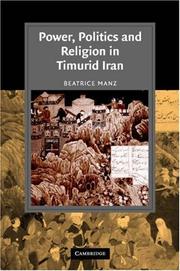| Listing 1 - 2 of 2 |
Sort by
|
Book
ISBN: 9781848857261 1848857268 9781784531287 1784531286 Year: 2012 Volume: 1 Publisher: London ; New York I.B. Tauris Publishers
Abstract | Keywords | Export | Availability | Bookmark
 Loading...
Loading...Choose an application
- Reference Manager
- EndNote
- RefWorks (Direct export to RefWorks)
"Having monopolized Central Asian politics and culture for over a century, the Timurid ruling elite was forced from its ancestral homeland in Transoxiana at the turn of the sixteenth century by an invading Uzbek tribal confederation. The Timurids travelled south: establishing themselves as the new rulers of a region roughly comprising modern Afghanistan, Pakistan and northern India, and founding what would become the Mughal Empire (1526-1857). The last survivors of the House of Timur, the Mughals drew invaluable political capital from their lineage, which was recognized for its charismatic genealogy and court culture - the features of which are examined here. By identifying Mughal loyalty to Turco-Mongol institutions and traditions, Lisa Balabanlilar here positions the Mughal dynasty at the centre of the early modern Islamic world as the direct successors of a powerful political and religious tradition."--
Legitimation. --- Timurider --- Timurids --- Timurids. --- Historia. --- History. --- Timuriden. --- 1526-1765. --- Geschichte 1483-1707. --- India --- India. --- Indien. --- Mogul Empire --- Mogulreich. --- Mogulriket --- History

ISBN: 0521865476 9780521865470 9780511497483 9780521153461 0511269757 9780511269752 0511268645 9780511268649 0511269315 9780511269318 9780511270314 0511270313 9786610750658 6610750653 0511497482 0521153468 1107169968 1280750650 0511320779 0511268017 Year: 2010 Publisher: Cambridge Cambridge University Press
Abstract | Keywords | Export | Availability | Bookmark
 Loading...
Loading...Choose an application
- Reference Manager
- EndNote
- RefWorks (Direct export to RefWorks)
Beatrice Forbes Manz uses the history of Iran under the Timurid ruler Shahrukh (1409-1447) to analyse the relationship between government and society in the medieval Middle East. She provides a rich portrait of Iranian society over an exceptionally broad spectrum - the dynasty and its servitors, city elite and provincial rulers, and the religious classes, both ulama' and Sufi. The work addresses two issues central to pre-modern Middle Eastern history: how a government without the monopoly of force controlled a heterogeneous society, and how a society with diffuse power structures remained stable over long periods. Written for an audience of students as well as scholars, this book provides a broad analysis of political dynamics in late medieval Iran and challenges much received wisdom about civil and military power, the relationship of government to society, and the interaction of religious figures with the ruling class.
Gesellschaft --- Politik --- Religion --- Timuriden --- Timurids --- Geschichte --- History. --- Tīmūrides (dynastie). --- Iran --- Iran. --- Timuridenreich. --- Politics and government. --- Politique et gouvernement --- History of Asia --- anno 1400-1499 --- Arts and Humanities --- History
| Listing 1 - 2 of 2 |
Sort by
|

 Search
Search Feedback
Feedback About UniCat
About UniCat  Help
Help News
News